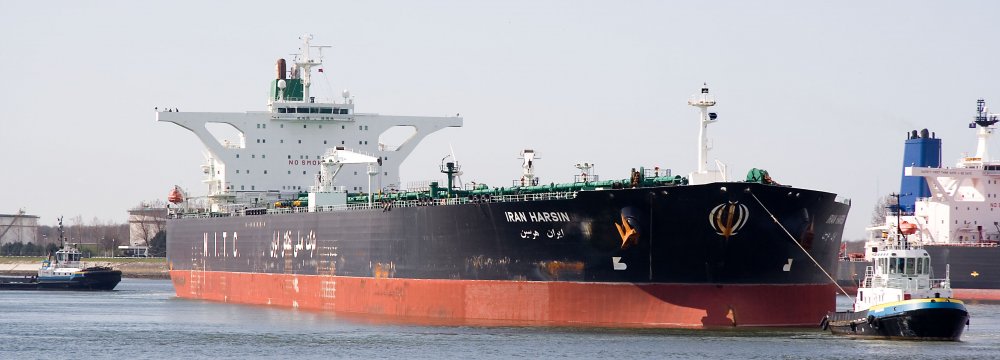
Iran's NITC Open to Modernize Oil Tanker Fleet With Norway's Aid

"NITC has been in touch with Norwegian ship parts and equipment manufacturers in the last 20 years and we hope to keep up this collaboration," Sirous Kianersi said at the Iran-Norway Bilateral Maritime Opportunities conference in Oslo on Thursday, IRNA reported.
The state-owned company plans to modernize its fleet of around 70 tankers, one of the largest in the world, under a five-year program, and Norwegian companies are "on the NITC's list" to help the company upgrade its large fleet.
NITC is on a mission to reduce the average age of its tanker fleet from 10 years old, According to Kianersi who says the renovation program will not affect NITC's capacity of 15 million deadweight tonnage.
NITC and the national shipping line IRISL plan to form a joint venture in collaboration with the Industrial Development and Renovation Organization to renovate NITC vessels.
Plan to renovate Iranian tankers started to take shape following Tehran's nuclear deal with the world powers in mid-2015, which led to the lifting of an array of sanctions, including restrictions on the passage of Iranian tankers in international waters and ports, in the following year.
The company also owns three liquefied natural gas carriers, but it aims to acquire more LNG tankers in line with plans to launch several LNG facilities in the Persian Gulf region.
It comes as Oslo-based firm IFLNG has reached a preliminary agreement with NITC to help Iran produce LNG by chartering an offshore gas production and liquefaction unit off the Persian Gulf coast, with the first extraction forecast to begin before 2019.
Sulfur Emissions
Kianersi also said his company has joined hands with the research and development arm of the Oil Ministry, known as RIPI, to cut down on sulfur emissions of its tankers.
"To meet international obligations, we have signed a deal with RIPI to reduce sulfur emissions of our crude oil vessels," Kianersi said in Oslo.
In Oct. 2016, the International Maritime Organization of the United Nations laid down new requirements to see sulfur emissions of vessels fall from the current maximum of 3.5% of fuel content to 0.5%. The new limit will come into force from 2020.
The shipping industry is among the world’s biggest sulfur emitters, with sulfur oxide content in heavy fuel oil up to 3,500 times higher than the latest European diesel standards for vehicles.
According to reports, NITC had signed more than 70 contracts by the middle of 2017 to lease vessels to international customers since the lifting of sanctions, the company's data show.


Trump weighs using $2 billion in CHIPS Act funding for critical minerals

Codelco cuts 2025 copper forecast after El Teniente mine collapse

Electra converts debt, launches $30M raise to jumpstart stalled cobalt refinery

Barrick’s Reko Diq in line for $410M ADB backing

Abcourt readies Sleeping Giant mill to pour first gold since 2014

Nevada army depot to serve as base for first US strategic minerals stockpile

SQM boosts lithium supply plans as prices flick higher

Viridis unveils 200Mt initial reserve for Brazil rare earth project

Tailings could meet much of US critical mineral demand – study

Kyrgyzstan kicks off underground gold mining at Kumtor

Kyrgyzstan kicks off underground gold mining at Kumtor

KoBold Metals granted lithium exploration rights in Congo

Freeport Indonesia to wrap up Gresik plant repairs by early September

Energy Fuels soars on Vulcan Elements partnership

Northern Dynasty sticks to proposal in battle to lift Pebble mine veto

Giustra-backed mining firm teams up with informal miners in Colombia

Critical Metals signs agreement to supply rare earth to US government-funded facility

China extends rare earth controls to imported material

Galan Lithium proceeds with $13M financing for Argentina project

Kyrgyzstan kicks off underground gold mining at Kumtor

Freeport Indonesia to wrap up Gresik plant repairs by early September

Energy Fuels soars on Vulcan Elements partnership

Northern Dynasty sticks to proposal in battle to lift Pebble mine veto

Giustra-backed mining firm teams up with informal miners in Colombia

Critical Metals signs agreement to supply rare earth to US government-funded facility

China extends rare earth controls to imported material

Galan Lithium proceeds with $13M financing for Argentina project

Silver price touches $39 as market weighs rate cut outlook

















